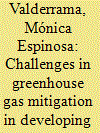| Srl | Item |
| 1 |
ID:
162917


|
|
|
|
|
| Summary/Abstract |
CO2eq emission scenarios for the Colombian transport sector were estimated for 2010–2050. We used a marginal abatement cost approach to assess an emission mitigation pathway. For this purpose, we constructed a carbon emission accounting model linking travel demand to vehicle stock, fuel consumption, and emissions for the Colombian transport sector. Actions related to energy efficiency, fuel switching, new engine technologies and modal change were considered. The analyzed measures have the potential to reduce the cumulative emissions by 8% and 18% under the BAU scenario through 2030 and 2050, respectively. Mitigation costs are high and imply annual capital costs that range from 0.5% to 4% of the national GDP. Gains in efficiency as well as synergy with other sector objectives might help justify some of the actions in financial terms. Non-technological actions, such as high public transit participation in the urban modal share and reorganization of the freight system, play a significant role in attaining low-carbon transport systems in Colombia.
|
|
|
|
|
|
|
|
|
|
|
|
|
|
|
|
| 2 |
ID:
169741


|
|
|
|
|
| Summary/Abstract |
A growing number of cities have set ambitious mid-century targets for greenhouse gas (GHG) emissions reduction and increased use of renewable energy. Using the municipal jurisdiction of Vancouver, Canada as a case study, we integrated an energy-economy model with an urban land-use and infrastructure model to test the possible actions resulting from policies potentially available to this city government in pursuit of its 2050 target of 100 percent renewable energy and an 80 percent reduction of GHG emissions. We found that, while cities like the one we studied have some important options for reducing energy use by their inhabitants, they may lack the authority to completely transform the energy system, especially for causing a wholesale switch to renewable energy for deep decarbonization. To achieve such ambitious energy and GHG targets, cities with jurisdictional powers comparable to the city we studied are dependent to some degree on complementary GHG and energy policies from senior levels of government.
|
|
|
|
|
|
|
|
|
|
|
|
|
|
|
|
| 3 |
ID:
189284


|
|
|
|
|
| Summary/Abstract |
This study discusses the human security costs and benefits generated by the coronavirus (COVID-19) pandemic-induced state monopoly on the urban public transport system in Zimbabwe through the Zimbabwe United Passenger Company (ZUPCO) since March 2020. Using empirical evidence from Harare, it argues that the ZUPCO initiative had far-reaching safety and security implications on urban residents’ lives during the COVID-19 pandemic. The study found that though the ZUPCO initiative mainly benefited commuters through affordable fares, it had many human security costs. The costs included reduced safety and decreased and unreliable services, which exposed the commuting public to the risk of contracting COVID-19 and other security challenges. The state monopoly on urban transport exacerbated the social and economic impact of COVID-19, promoted inequalities, police corruption and urban residents’ use of informal transport services, which were unsafe and costly. The study concludes that the Zimbabwean government lacks the capacity to provide services in the urban transport sector, akin to nearly every sector in the country. As a stop-gap measure, the government is encouraged to regulate and allow private players to complement its efforts for the benefit, convenience, security, and safety of commuters until it develops an efficient urban public transport system.
|
|
|
|
|
|
|
|
|
|
|
|
|
|
|
|